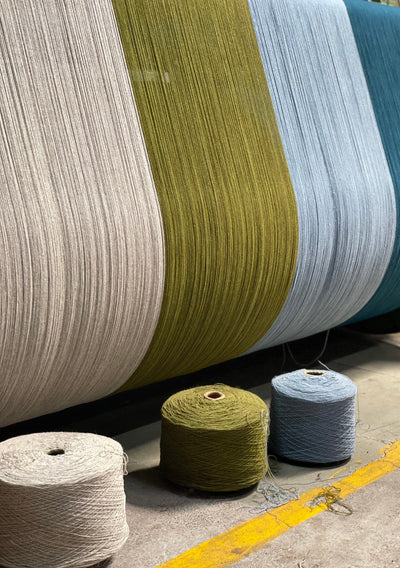Which is better? Wool Vs Polyester

Choosing the right material for our clothing, accessories and homeware is super important. So many things come into play when it comes to picking the fibre that’s right for you - what’s the piece’s function, what environmental considerations are there, and what options are available within your budget? It’s a lot of questions to be faced with when all we want to do is get some new bedding or treat ourselves to a new outfit.
Honestly, it would be fun to write a blog titled: “Wool vs Polyster is the great debate”, but really it’s a no-brainer. Wool wins, every time.
Is wool better than polyester?
Yes, yes it is. But let’s discuss why.
Wool is a natural material
It’s not a shock to find out that wool comes from a sheep, but what might be a surprise is that polyester is entirely man-made, and out of petroleum no less. Because wool is a naturally occurring fibre, it is biodegradable and can be returned to the earth.
For comparison, it’s estimated that wool takes between three-four months to decompose, whereas polyester - composed of plastic - can take hundreds of years.
Which is more breathable, wool or polyester?
Wool is a naturally breathable fibre - this means that any moisture you produce when wearing a woollen scarf or under a wool blanket (such as sweat) is wicked away, keeping you as fresh as a daisy.
Wool reacts to changes in body temperature because the dense twill of the fibres creates teeny tiny air pockets. So, there’s little danger of feeling clammy in your favourite scarf. It’s the same science that makes wool odour resistant, so no bad smells get trapped in the fabric - how good is that!?
Polyester is moisture-resistant, meaning any dampness on or between the fabric is trapped. Sweat patches are a big no from us.
Is wool good for sleeping in?
You bet! Wool, particularly lambswool which is super soft, is a great material for sleeping on or under. Thanks to its breathability, amongst other things, wool has been proven to be temperature-regulating. This means that you fall asleep faster, for longer, and generally sleep better with wool.
Is polyester sustainable?
Polyester isn’t the greatest material in the world, and studies have shown it can be incredibly harmful to the environment. Polyester is made up of plastic, which can release microplastics into water during production, washing and through general wear, contributing to plastic pollution. And a lot of water goes into polyester production - a large amount is needed to cool the fabric as part of the process.
Polyester also uses special dyes to colour the fabric / make it stain resistant which are insoluble in water. These dyes can also be toxic to humans, making polyester as bad for you as it is for the planet.
Why choose wool over polyester?
There are so many reasons to choose wool over polyester - wool is a stronger, natural fibre, used in products that are designed to last. Not to mention that, in our biased opinion, wool is infinitely comfier to wear, sleep under, or have in a blanket. Sourced correctly, wool is kinder on the planet and its people.
If polyester is needed to be used, then opt for a recycled version.
Wool wins over polyester every time.






























